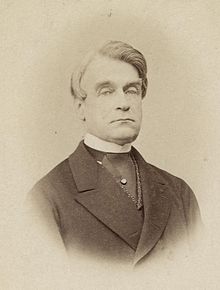Ignaz von Plener
Ignaz von Plener (born May 21, 1810 in Vienna ; † February 17, 1908 there ) was an Austrian politician, minister and prime minister .
Life
Ignaz Plener was the son of a senior official in the Ministry of Finance. He studied law at the University of Vienna from 1827 to 1833 and entered civil service in 1836. In 1841 he came to Eger as a finance advisor , to Prague in 1848 , later to Pest and in 1851 to Pressburg as state finance director . In 1856 he was ennobled (“Edler von”), and in 1857 he was appointed state finance director to Lemberg . He was significantly involved in the enforcement of the neo-absolutist tax administration in the monarchy. In 1859 he returned to Vienna as a member of the Reichsrat , where he campaigned for parliamentary financial control.
From 1860 to 1865 Plener was Austrian Finance Minister. As early as 1862 he was able to present a balanced budget through austerity policies and a reduction in banknotes in circulation. In doing so, he laid the foundations for the economic upswing of the early days . He was involved in the drafting of the February patent and from 1861 a member of the Bohemian state parliament . He opposed the absolutist and federalist policies of Prime Minister Richard Belcredi . He resigned in 1865 to protest against its suspension of the constitution.
Centralism was vital for Plener, because the Germans want and have to want it, because they are in the minority in Bohemia, that they form a unified whole with the Germans of the other Crown Lands through the Central Parliament, so that they are not in the Bohemian Landtag ... rise . He saw in the German (in today's parlance: German-Austrian) dominance and the undisturbed connection with the German Bohemians and German Moravians an elementary prerequisite for the national existence and strength of “Austrodeutschtum”.
In citizen's ministry from 1867 to 1870 was Plener trade minister. He was particularly interested in the expansion of the railway system through the licensing of many private railways, a reform of the major banks, the introduction of statistics and the liability law , and the reorganization of the chambers of commerce . from January 15 to February 1, 1870 he acted temporarily as Austrian Prime Minister.
From 1873 until the end of his life he was a member of the manor house for the conservative wing of the old liberal " Constitutional Party " . Politically he was linked to the liberalist camp , but fought vigorously against the split of the national liberals and against the advance of the idea of a unified empire of all Germans at the expense of the Habsburg dynastic and historical understanding of the state.
In 1888 the Plenergasse in Vienna- Währing (18th district) was named after him.
His son Ernst von Plener also became Austrian Finance Minister, then President of the Court of Auditors. Ignaz von Plener was elevated to the hereditary baron status by the emperor in 1907. Plener found his final resting place in the family crypt in the Hietzingen cemetery .
literature
- Constantin von Wurzbach : Plener, Ignaz Edler von . In: Biographisches Lexikon des Kaiserthums Oesterreich . 22nd part. Kaiserlich-Königliche Hof- und Staatsdruckerei, Vienna 1870, pp. 420–423 ( digitized version ).
- Mechtild Wolf: Ignaz von Plener: From the fate of a minister under Emperor Franz Joseph . Verlag Lerche, Munich 1975 (= scientific materials and contributions to the history and regional studies of the Bohemian countries; 20), ISBN 3-87478-112-1 .
- Evelyn Werner: The two plener. Two generations of Austrian liberalism. Unprinted dissertation, Vienna 1981.
Web links
- Ignaz von Plener in the Vienna History Wiki of the City of Vienna
Individual evidence
- ^ A b c W. Goldinger: Plener Ignaz Frh. Von. In: Austrian Biographical Lexicon 1815–1950 (ÖBL). Volume 8, Verlag der Österreichischen Akademie der Wissenschaften, Vienna 1983, ISBN 3-7001-0187-2 , p. 123.
- ↑ a b Helmut Rumpler: Plener, Ignaz Freiherr von. In: New German Biography (NDB). Volume 20, Duncker & Humblot, Berlin 2001, ISBN 3-428-00201-6 , p. 529 ( digitized version ).
- ↑ Entry on Ignaz von Plener in the Austria Forum (in the AEIOU Austria Lexicon )
- ^ Helmut Slapnicka: The powerlessness of parliamentarism. In: Ferdinand Seibt (Ed.): The chance of understanding. Intentions and approaches to supranational cooperation in the Bohemian countries 1848–1918 . Verlag Oldenbourg, Munich 1987, ISBN 3-486-53971-X , pp. 147-174, here: p. 148.
- ^ Eberhard Kolb, Elisabeth Müller-Luckner: Europe before the war of 1870. Oldenbourg publishing house, Munich 1987, ISBN 3-48654-121-8 , pp. 20f.
| personal data | |
|---|---|
| SURNAME | Plener, Ignaz von |
| BRIEF DESCRIPTION | Austrian politician, minister and prime minister |
| DATE OF BIRTH | May 21, 1810 |
| PLACE OF BIRTH | Vienna |
| DATE OF DEATH | February 17, 1908 |
| Place of death | Vienna |


